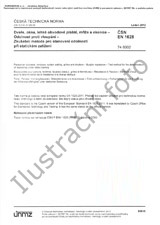Potřebujeme váš souhlas k využití jednotlivých dat, aby se vám mimo jiné mohly ukazovat informace týkající se vašich zájmů. Souhlas udělíte kliknutím na tlačítko „OK“.
ČSN EN 16803-2 (310560)
Kosmos - Využití systému GNSS pro určování polohy inteligentními dopravními systémy (ITS) podél pozemní komunikace - Část 2: Posouzení základních vlastností terminálů GNSS pro určování polohy (Norma k přímému použití jako ČSN).
Přeložit název
NORMA vydána dne 1.3.2021
Informace o normě:
Označení normy: ČSN EN 16803-2
Třídící znak: 310560
Katalogové číslo: 511529
Datum vydání normy: 1.3.2021
Kód zboží: NS-1018557
Počet stran: 90
Přibližná hmotnost: 301 g (0.66 liber)
Země: Česká technická norma
Kategorie: Technické normy ČSN
Anotace textu normy ČSN EN 16803-2 (310560):
Like the other documents of the whole series, this document deals with the use of GNSS-based positioning terminals (GBPT) in road Intelligent Transport Systems (ITS). GNSS-based positioning means that the system providing position data, more precisely Position, Velocity and Time (PVT) data, comprises at least a GNSS receiver and, potentially, for performance improvement, other additional sensor data or sources of information that can be hybridized with GNSS data.
This new document proposes testing procedures, based on the replay of data recorded during field tests, to assess the basic performances of any GBPT for a given use case described by an operational scenario. These tests address the basic performance features Availability, Continuity, Accuracy and Integrity of the PVT information, but also the Time-To-First-Fix (TTFF) performance feature, as they are described in EN 16803-1, considering that there is no particular security attack affecting the SIS during the operation. This document does not cover the assessment tests of the timing performances other than TTFF, which do not need field data and can preferably be executed in the lab with current instruments.
"Record and Replay" (R&R) tests consist in replaying in a laboratory environment GNSS SIS data, and potentially additional sensor data, recorded in specific operational conditions thanks to a specific test vehicle. The data set comprising GNSS SIS data and potential sensor data resulting from these field tests, together with the corresponding metadata description file, is called a "test scenario". A data set is composed of several data files.
This EN 16803-2 addresses the "Replay" part of the test scenario data set. It does not address the "Record" part, although it describes as informative information the whole R&R process. This "Record" part will be covered by EN 16803-4 under preparation.
Although the EN 16803 series concerns the GNSS-based positioning terminals and not only the GNSS receivers, the present release of this document addresses only the replay process of GNSS only terminals. The reason is that the process of replaying in the lab additional sensor data, especially when these sensors are capturing the vehicle´s motion, is generally very complex and not mature enough to be standardized today. It would need open standardized interfaces in the GBPT as well as standardized sensor error models and is not ready to be standardized. But, the procedure described in the present EN has been designed to be extended to GBPT hybridizing GNSS and vehicle sensors in the future.
This EN 16803-2 does not address R&R tests when specific radio frequency signals simulating security attacks are added to the SIS. This case is specifically the topic of EN 16803-3.
Once standardized assessment tests procedures have been established, it is possible to set minimum performance requirements for various intelligent transport applications but it makes sense to separate the assessment tests issue from minimum performance requirements, because the same test procedure may be applicable to many applications, but the minimum performance requirements typically vary from one application to another. So, this document does not set minimum performance requirements for any application
Náhled normy ČSN EN 16803-2 (310560)
Doporučujeme:
Aktualizace technických norem
Chcete mít jistotu, že používáte pouze platné technické normy?
Nabízíme Vám řešení, které Vám zajistí měsíční přehled o aktuálnosti norem, které používáte.
Chcete vědět více informací? Podívejte se na tuto stránku.




 Cookies
Cookies
